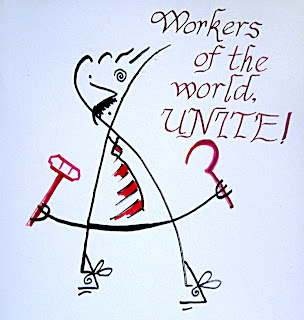
This actually isn't the post I promised a while back, but related: what do we mean when we talk about "liberty"?
Michele Bachmann: "Whether it’s economic liberty, religious liberty, liberty in our finances, liberty in being able to choose the profession we have." (Link) Religion, yes; but please note that the other three things are all about money. (And what is love of money the root of?)
In the Bill of Rights, the best you can do to support this view is the Ninth Amendment; since I am relatively sure that most of my readers have no idea what it says, here's the complete text: "The enumeration in the Constitution, of certain rights, shall not be construed to deny or disparage others retained by the people."
So what else is contained in the Bill of Rights? Free speech, freedom of the press; freedom to assemble peaceably, the right to petition the government for a redress of grievances, in the first amendment alone. Note that these are positive freedoms, things we can do, rather than negative freedoms. Negative freedoms include not having to quarter soldiers, not being subjected to unreasonable search and seizure, not being compelled to serve as witness against oneself, deprived of due process, or have private property take for public use without just compensation. Positively, we should be allowed a speedy and public trial, by jury if we so choose. Negatively, we shouldn't be subject to cruel or unusual punishment. I have left off the second and tenth amendment - I'll come back to those shortly. It's important to notice that all of these have to do with overreach by government, the sorts of overreach that the colonists were subject to and wanted to prevent in this new country. It doesn't say anything about economics, a field that was just barely getting started at the time this was written; that cuts both ways, in that the founders weren't thinking about it one way or another, at least in concrete ways they were willing to enshrine in the bill of rights. I can also certainly point to instances where these seem to have been violated; the city in which I live still bears the scars of private property taken for public use - the interstate freeway - that wasn't compensated justly, to name one example off the top of my head.
I'm surprised that Michele Bachmann didn't mention the second amendment, but of course it wouldn't have fit with the narrative of either economic freedom or why her ancestors came to this country. Also, the tenth amendment has been getting more press recently, in terms of states' rights. Just one quick note, since I don't think this can be said often enough these days: the secession of the Confederacy wasn't about "rights" in the plural, only about one "right": the "right" of a person to own another as property.
What do we not see in the bill of rights? "Economic liberty... liberty in our finances, liberty in being able to choose the profession we have." Not that I want the government telling me what job I can do (although the government telling me what job I can't do - for instance, I don't think you would want me to do tattoo removal - is a good thing!) But there is there is a lot more to "liberty" than being able to buy cheap stuff at WalMart and pollute the earth with your SUV.
No comments:
Post a Comment